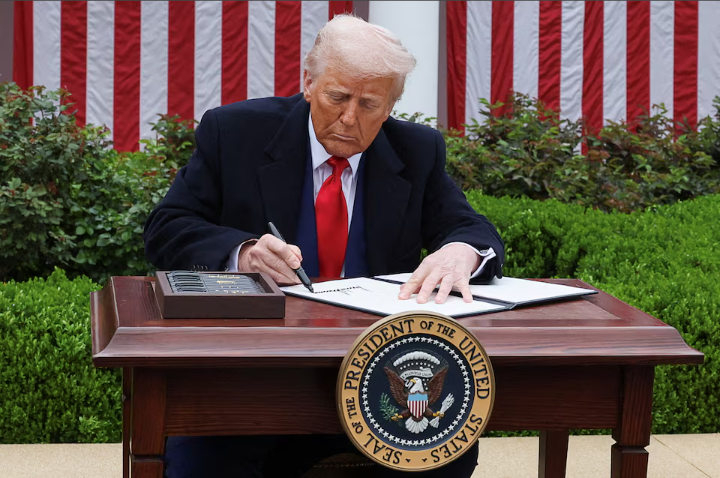In a bold move that has sparked a global economic ripple effect, President Donald Trump recently imposed sweeping tariffs on imports to the United States, igniting fears of an escalating trade war.
The 10% baseline tariff on all imports, along with higher duties on goods from some of America’s biggest trading partners, sent shockwaves through the international economy, drawing condemnation from countries around the world and threatening the stability of global trade.
The announcement, made on April 2, 2025, unleashed turmoil across global stock markets, with investors scrambling to find safe havens like gold and bonds. As fears of a recession mount, world leaders, including those from China and the European Union (EU), vowed to retaliate with countermeasures, promising a tit-for-tat response to Trump’s tariffs.
While the U.S. president argued that these tariffs were a necessary action to protect American manufacturing jobs and boost the domestic economy, critics warn that the consequences could be devastating, with millions potentially facing higher costs and uncertainty.
The Fallout from Trump’s Tariffs
The U.S. tariffs are the highest seen in over a century, according to Fitch Ratings, and their impact is already being felt worldwide. With new levies on everything from luxury Italian coffee to Japanese whisky and sportswear, American consumers are set to face higher prices.
The U.S. administration justified these measures as a response to the tariffs and trade barriers already imposed on U.S. goods by other nations. However, experts believe that this protectionist move could lead to greater economic instability, possibly even pushing the U.S. economy into a recession.
Among Trump’s closest allies, the EU faces a 20% tariff, Japan 24%, South Korea 25%, and Taiwan 32%. Even some remote territories, such as uninhabited islands in Antarctica, have been affected by the sweeping tariffs. While the U.S. has argued that the tariffs will create new alliances and improve domestic manufacturing, many global leaders are expressing concern about the long-term impact of these aggressive policies.
Global Reactions and Economic Concerns
As the news of the tariffs spread, global stock markets plummeted, with investors fleeing to more stable assets. Economists from Barclays and Bank of America warned that the U.S. economy could be on the brink of a recession, estimating that the new tariffs could subtract as much as 1-1.5% from the GDP. Moreover, the tariffs are expected to drive up inflation, increasing the cost of living for American families by thousands of dollars annually.

In response, the EU and China have both pledged to retaliate, with the EU preparing countermeasures if negotiations fail. Ursula von der Leyen, President of the European Commission, warned that these tariffs could lead to a rise in protectionism globally, resulting in far-reaching consequences for trade and the global economy. On the other hand, Trump maintains that these measures are necessary to level the playing field for U.S. businesses and to punish countries that impose unfair trade barriers on American goods.
The Road Ahead: A Shifting Global Landscape
The imposition of these tariffs marks the beginning of a new era in global trade, with old alliances and relationships being tested in favor of potential new ones. Some countries, such as Canada and Mexico, have already faced similar tariffs, while others like Spain are beginning to roll out economic plans to soften the blow. For African nations, already dealing with poverty, debt, and other severe challenges, the tariffs could have particularly devastating effects.
With uncertainty surrounding the future of global trade, companies worldwide are grappling with how to adjust to the new reality. As Trump pushes for more aggressive protectionist policies, the potential for a global economic slowdown looms large, with repercussions that could be felt for years to come.



